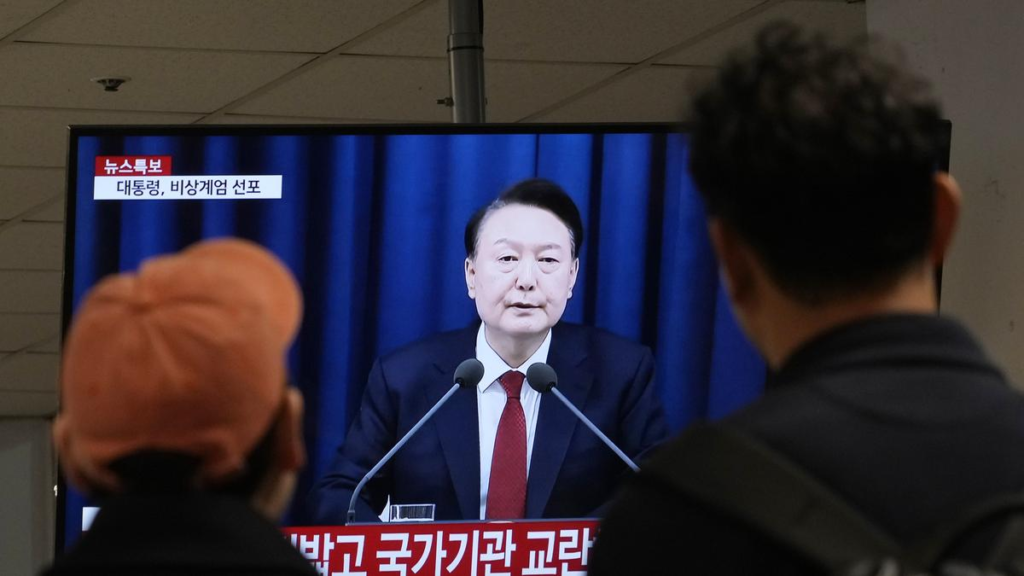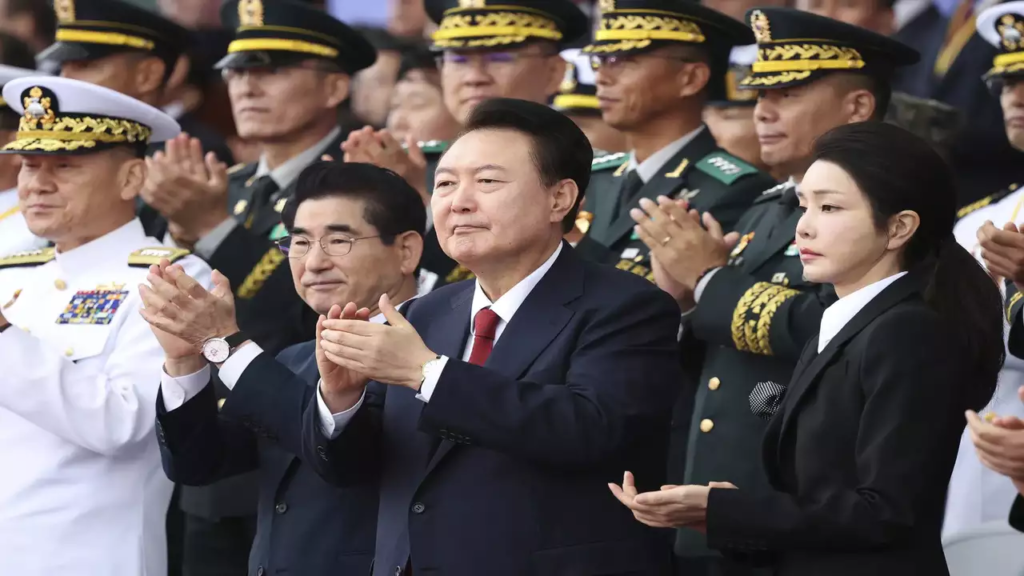South Korea has been thrust into a state of uncertainty after President Yoon Suk Yeol declared Emergency Martial Law in a surprise late-night national address. This announcement, aired on YTN television and later reported by Reuters, has sent shockwaves across the nation, evoking memories of the country’s turbulent past under authoritarian regimes.
With a stated aim to protect the nation’s constitutional order and eradicate “pro-North Korean anti-state forces,” Yoon’s decision has ignited political and economic tensions, leaving the future of South Korea in a precarious state.
The President’s Justification and Political Context
President Yoon’s address emphasized the urgency of the situation, though he did not point to any immediate threat from North Korea. Instead, his focus was sharply directed at internal political adversaries.
The president framed his move as necessary to safeguard country’s democratic institutions from being undermined by opposition forces, particularly targeting the Democratic Party, which holds a majority in the National Assembly.
Yoon’s declaration comes amid escalating political conflict. The opposition recently pushed for an impeachment motion against top prosecutors and rejected a significant government budget proposal, moves Yoon condemned as destabilizing.
According to him, the opposition’s actions have paralyzed parliamentary processes, threatening national stability. “I declare martial law to protect the free Republic of Korea from the threat of North Korean communist forces,” Yoon stated, painting the opposition as dangerously aligned with hostile ideologies.
Read : South Korea Could Be the First Country to Disappear from Earth Within 100 Years
The defense minister’s reported proposal of martial law underscores the government’s perception of a severe crisis. However, the lack of clear measures or a defined action plan has fueled anxiety.
Read : Kim Jong Un’s Sister Calls South Korea’s Live-Fire Drills ‘Suicidal Hysteria’
What constitutes these “anti-state forces” and how the administration plans to address them remain ambiguous. This vagueness has left the public and international observers speculating about the potential for widespread civil unrest or political purges.
Reactions from the Opposition and the Public
The Democratic Party’s leader, Lee Jae-myung, delivered a stark warning in response to Yoon’s declaration. Lee accused the president of dragging the country back into authoritarian rule, predicting dire economic and social consequences.
“Tanks, armored personnel carriers, and soldiers with guns and knives will rule the country,” he proclaimed, urging citizens to rally at the National Assembly. This call to action reflects the depth of the political divide and the high stakes involved.
South Korea’s history adds weight to these concerns. The nation transitioned from military rule to democracy in the late 1980s after years of struggle.

Martial law evokes painful memories of past crackdowns, including the infamous Gwangju Uprising of 1980, when hundreds of pro-democracy protesters were killed. For many South Koreans, Yoon’s move signals a dangerous regression, raising fears of renewed state repression and a rollback of hard-won freedoms.
Public reaction has been mixed but largely apprehensive. While some citizens support Yoon’s tough stance against perceived threats to national security, many view the declaration as an overreach.
Protests have erupted in major cities, and social media is abuzz with criticism, drawing parallels to past authoritarian regimes. The situation has also impacted South Korea’s economy, with the won falling sharply against the US dollar, reflecting investor nervousness about the country’s stability.
Economic and International Implications
The economic fallout from Yoon’s announcement has been immediate and severe. The South Korean won’s sharp decline signals eroding confidence among investors, both domestic and international.
South Korea’s economy, known for its resilience and innovation, now faces uncertainty. Businesses are wary of potential disruptions, and analysts predict a challenging period ahead if political instability continues.
Internationally, the declaration has raised concerns among South Korea’s allies. The United States and other Western nations have long viewed South Korea as a model of democratic progress and economic success in Asia.
#BREAKING #SouthKOREA #CoreaDelSur
— LW World News 🌍 (@LoveWorld_Peopl) December 3, 2024
Something is happening in South Korea..
🔴 SOUTH KOREA : 📹 PRESIDENT YOON SUK YEOL DECLARED AN EMERGENCY MARTIAL LAW,
Tuesday, accusing the country’s opposition of controlling the parliament, sympathizing with North Korea and paralyzing the… pic.twitter.com/9373Trcqoi
Yoon’s move could strain these relationships, particularly if the situation escalates or if human rights violations occur. The geopolitical implications are also significant. Any internal instability in South Korea could embolden North Korea, which remains a persistent security threat.
The absence of a clear threat from North Korea in Yoon’s address raises questions about the true motivations behind the declaration.
Critics argue that Yoon is using national security as a pretext to consolidate power and suppress political opposition. If true, this could undermine South Korea’s democratic institutions and weaken its standing on the global stage.
The coming days will be crucial in determining the impact of Yoon’s decision. Much depends on how the government implements martial law and whether it respects democratic norms.
The international community will be watching closely, and any signs of authoritarian overreach could prompt strong reactions, including economic sanctions or diplomatic isolation.

President Yoon Suk Yeol’s declaration of martial law has plunged South Korea into a state of political and economic uncertainty. While Yoon frames the move as necessary to protect the nation’s constitutional order, many view it as a dangerous step toward authoritarianism.
The political conflict between Yoon’s government and the opposition Democratic Party has reached a boiling point, threatening to destabilize the country’s democratic institutions.
Public reaction has been marked by fear and skepticism, with many South Koreans recalling the dark days of military rule. The economic consequences are already apparent, with the won falling sharply and investor confidence eroding. Internationally, the move raises concerns about South Korea’s democratic future and its implications for regional stability.
As the situation unfolds, the world will be watching to see whether South Korea can navigate this crisis without sacrificing its democratic principles. For now, the nation stands at a crossroads, facing a test that will shape its future for years to come.

